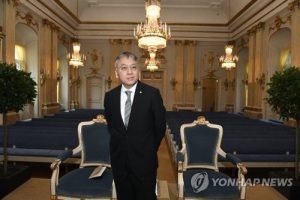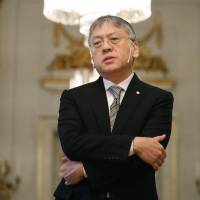いよいよNobel Weekが近づいてきた。一番の楽しみはKazuo Ishiguroさんが何を話すか。日本人ではないけれど日本で生まれ、それを懐かしみ、日本にルーツがあることを誇りにする人。
Decent Manの見本のような人。
スウェーデンに到着し、ストックホルムで講演を行ったときの模様を伝える新聞記事を保存。
Kazuo Ishiguro ‘very touched’ by Japanese reaction to Nobel Win
DEC 7, 2017 JIJI, KYODO
LONDON – British author Kazuo Ishiguro, winner of the 2017 Nobel Prize in literature, said Wednesday he was happy to learn that people in Japan celebrated his recognition.
Ishiguro was born in Nagasaki in 1954 and moved at age 5 to Britain, where he still lives and writes in English.
“I’ve been very touched … by the emotion with which people in Japan seem to have received this news,” he said at a news conference in Stockholm. “I hope the Japanese people can feel proud of this victory, just as people in Britain feel proud of this victory.”
Ishiguro said the Nobel prize “symbolizes something that people all around the world wish for, which is that human beings strive together, not in competition,” and “try and actually improve our civilization.”
The award ceremony is scheduled for Sunday in Stockholm.
Ishiguro said his mother was a victim of the U.S. atomic bombing of Nagasaki on Aug. 9, 1945, in the closing days of World War II.
“So in a way, I’ve grown up under the shadow of” the atomic bombing, he said.
“I hope that somehow we can continue to live in safety, although our world is becoming increasingly dangerous,” Ishiguro said.
He also said he was happy that the International Campaign to Abolish Nuclear Weapons (ICAN), a coalition of international nongovernmental organizations, won this year’s Nobel Peace Prize.
The award put a renewed spotlight on the nuclear issue, he said.
“I applaud this new generation of people who have created ICAN,” he said.
Following the end of the Cold War, Ishiguro said, people seemed to assume that nuclear weapons would disappear.
But “the weapons are there” and “seem to be moving around … in less controlled hands,” he said.
分断の時代、文学が声を カズオ・イシグロ氏がノーベル賞講演
7日、ストックホルムのスウェーデン・アカデミーで講演するカズオ・イシグロ氏=AP・共同
【ストックホルム=共同】今年のノーベル文学賞を受賞する英国人作家カズオ・イシグロ氏(63)が七日(日本時間八日未明)、スウェーデンのストックホルムのスウェーデン・アカデミーで記念講演を行った。世界に広がる貧富の格差や人種差別主義を踏まえ、「分断が危険なまでに深まる時代に、良い作品を書き、読むことで壁は打ち壊される」と述べ、文学者が担う使命の重要性を説いた。
講演のタイトルは「私の二十世紀の夕べ-そしていくつかのささやかな発見」。イシグロ氏は「私にとって大切なのは物語が感情を伝えることであり、国境や分断を超えて人間が共有するものに訴えかけるということだ」と語った。
イシグロ氏は日本人の両親の下で長崎市に生まれ、五歳で渡英。講演では、大人になるにつれて記憶の中で薄れてゆく日本と向き合ったことが創作活動の原点であり、小説の中で「私にとっての日本」を築き直したいと思ったと振り返った。原爆投下からの復興を遂げる長崎を舞台にした最初の長編小説「遠い山なみの光」にも言及した。
英国の欧州連合(EU)離脱やトランプ米大統領の登場を念頭にして、子どもの頃から自明のものと信じてきたリベラルな価値観が根底から揺らぐ現実に、強い危機感を表明した。人種差別主義の広がりを「目覚めつつある怪物」に例えて、懸念を示した。
その上で「困難な環境を乗り越える時、文学が特に重要と信じる」と強調。「未来が不確実」な中で文学が形式にとらわれず、さまざまな声を反映して多様性を確保する大切さを訴えた。「私たちを鼓舞し、導く若い世代の作家たちに目を向けている。今は彼らの時代だ」とエールを送った。
イシグロ氏は十日に授賞式に臨む。日本出身の作家としては一九六八年の川端康成、九四年の大江健三郎氏に続く三人目、二十三年ぶりの受賞となる。
◆「私の中の日本 創作の原点」日英揺れた幼少期
カズオ・イシグロ氏は五歳で日本から渡英し、二つの文化の間で揺れた幼少期から現在までを振り返り、映画や音楽、自らの作品の創作手法について時折ジョークも交えながら幅広く語った。
「私は小学校でただ一人の英国人ではない子どもだった」。イシグロ氏は一九六〇年四月、両親らと共に英国へ。英国社会に溶け込みながらも、両親が日本人だったために「家庭の中では異なるルール、異なる言葉があった」などと幼少時代を振り返った。
シャンデリアが下がる荘厳な雰囲気の会場に現れたイシグロ氏はダークスーツにネクタイ姿。壁際まで埋めた約三百人の聴衆が聞き入る中、テーマは作品の登場人物の造形や映画まで多岐にわたった。ボブ・ディラン氏などミュージシャンの名も数多く挙げながら、「私も(ここで)歌おうかと思ったが、気が変わった」と笑わせる場面も。
会場には真剣な表情で話を聞く妻ローナさんと娘の姿もあった。日本でイシグロ作品を刊行する早川書房社長で、長年家族ぐるみで付き合う早川浩さんは「日英のはざまにいるイシグロさんならではの、両文化への冷静で温かな視点を感じた」と感慨深そうだった。
(ストックホルム・共同)
Nobel Laureate calls for more diverse for better literature
2017-12-08
STOCKHOLM, Dec. 7 (Xinhua) — Nobel Prize Laureate in Literature 2017 Kazuo Ishiguro appealed on Thursday that diversity is needed for better literature.
“If we are to play an important role in this uncertain future, if we are to get the best from the writers of today and tomorrow, I believe we must become more diverse,” said Kazuo Ishiguro, in the end of his Nobel Lecture at the Swedish Academy on Thursday.
In the end of his lecture titled “My Twentieth Century Evening — and Other Small Breakthroughs”, Ishiguro emphasized that the “diversity” he appealed was in “two particular senses”.
“Firstly, we must widen our common literary world to include many more voices from beyond our comfort zones of the elite first world cultures. We must search more energetically to discover the gems from what remain today unknown literary cultures, whether the writers live in far away countries or within our own communities,” he said.
“Secondly, we must take great care not to set too narrowly or conservatively our definitions of what constitutes good literature. The next generation will come with all sorts of new, sometimes bewildering ways to tell important and wonderful stories.” he added.
“We must keep our minds open to them, especially regarding genre and form, so that we can nurture and celebrate the best of them. In a time of dangerously increasing division, we must listen,” Ishiguro emphasized.
“Good writing and good reading will break down barriers. We may even find a new idea, a great humane vision, around which to rally,” he added.
The Nobel Prize in Literature for 2017 is awarded to Kazuo Ishiguro “who, in novels of great emotional force, has uncovered the abyss beneath our illusory sense of connection with the world”, the Swedish Academy announced in early October.
Nobel Laureates in Physics, Chemistry, Medicine, Literature and Economics gathered in Stockholm this week attending a series of events during the annual Nobel Week, which culminates on Dec. 10, when the Nobel Prize Award Ceremony will be held at the Stockholm Concert Hall and the Nobel Banquet held at Stockholm City Hall.
Editor:Jiang Yiwei
WIRED
2015.08.10 MON 16:40
「問い」から生まれるファンタジー:問題作『忘れられた巨人』をカズオ・イシグロが語る
日本生まれのイギリス人作家、カズオ・イシグロ。『わたしを離さないで』から10年の時を経て新作長編『忘れられた巨人』を発表した現代を代表するストーリーテラーは、どのような想いからこの作品を綴ったのか。『WIRED』US版と日本版が行ったそれぞれのインタヴューから、『忘れられた巨人』誕生の秘密を探る。
 PHOTOGRAPH BY KATSUMI OMORI (PORTRAIT)
PHOTOGRAPH BY KATSUMI OMORI (PORTRAIT)
TEXT BY GEEK’S GUIDE TO THE GALAXY & WIRED.jp_W
『忘れられた巨人』
カズオ・イシグロ・著 土屋政雄・訳 早川書房刊
何か大事なことが過去に起きたはずなのに、記憶にもやがかかっているようで思い出せない。そのもやの向こうにある「記憶」を探して老夫婦は旅に出る。旅するなかで夫婦が出会うのは、山の上に住むというドラゴンの秘密だった。その秘密の向こうに見え隠れする、無残な出来事の記憶。果たして、その記憶を取り戻すことは幸せを意味するのか? もしくは、それは新たな悲劇を意味するのか? 「忘れられた巨人」とはいったい何なのか? 当代きってストーリーテラー、カズオ・イシグロが、アーサー王伝説を下敷きにしながら贈る、異色のファンタジー・ノヴェル。
カズオ・イシグロは1989年に書いた『日の名残り』でブッカー賞を受賞した、文字通り世界で最も尊敬を集めている作家のひとりである。2005年には 『私を離さないで』を発表して世間を驚かせた。それは自分が臓器提供をするためにつくり出されたクローンであることを知ってしまった子どもたちを描いた、陰鬱な空想科学小説だったが、いまでは彼の代表作のひとつに数えられている。
今年出版された最新作『忘れられた巨人』は、ドラゴン退治の冒険を綴ったアーサー王物語風のファンタジーだが、文学界は驚くだけでは済まなかった。頭が吹っ飛ぶような衝撃を与えたのだ。この反応に、イシグロは困惑しているという。
「みなさんはわたしの本を読んで、この本は嫌いだ、と言う権利をおもちです」とイシグロは、『WIRED』US版のポッドキャストで語っている。「でももしみなさんが『以前の本はどれもよかったけれど、わたしはこの本は読まない。人食い鬼が出てくると人から聞いたからだ』と言うのなら、そんなのはただの偏見じゃないか、と思ってしまいます」
日本生まれのイシグロは、幼いころには妖怪がたくさん出てくるサムライの話が大好きだったという。成長してからはイーリアスやオデュッセイの新訳が出るたびにむさぼるように読みふけり、また戦士や神々、化け物などが登場する昔話や神話もよく読んだのだという。彼の生涯の友人で師と仰ぐアンジェラ・カーターもまた、謎とファンタジーに満ちたフィクションを書いた。イシグロは、こうしたものからインスピレーションを得て、分類不能な作品として本作を書き上げた。
「民話や神話というのは、いわゆる原始人がたき火を囲んで座り、語り合っていたころから用いられてきたツールです」と彼は言う。「古代ギリシャ人たちもローマ人たちも、スカンジナビアでも、日本でもヨーロッパのあらゆる地域でも、人間はずっとこうしたツールを使い続けてきたのです。どうしてここ数年になって突然のようにこれらを冷笑するのでしょうか」
一種のSFミステリーでもある『私を離さないで』や、ファンタジーをベースにした冒険譚である『忘れられた巨人』のような本は、近年出版が容易になってきているとイシグロは認める。2004年にデイヴィッド・ミッチェルが書いた『クラウド・アトラス』 がウォシャウスキー兄弟によって映画化されたのがいい例だが、若い世代の作家たちが、文学の世界で扱えるテーマの範囲を広げてくれているからだ。イシグロは『ビーチ』『28日後』といった作品で知られ、『Ex Machina』で自身でメガホンも撮ったアレックス・ガーランドと仲がよく、ガーランドのような若い世代がゲームやグラフィックノヴェルなどからの影響を隠し立てしないところに共感を覚える、と語る。
「わたしたちの世代の作家は、文学作家としてやっていいことといけないことについて、いまよりももっと先入観だらけの環境で育ってきました。ところがわたしよりも一世代、いや二世代ほども若い作家たちの作品のおかげで、わたしたちの世代の作家も古い決まり事から解放されたのです」
なぜ彼の最新作が一部の読者に驚きをもって受け取られたのか、彼にはまだ見当がつかない。しかし、何か不安を感じる部分があったのだろう、と彼は想像する。文学がステータスシンボルだという考えにしっかりと染まっている読者、あるいは真面目な人と思われたくてしょうがない人々なら、娯楽小説と思われる本を避けようとするのだろう。
「10代のころは誰だってこう言い合ったでしょう。『あんなバンドが好きな奴はクールじゃない。このスニーカーを履くやつはクールだ』とね。でも読書を楽しみたいのなら、そうした考え方からは卒業すべきです」と彼は言う。「おそらく何らかの理由で、ドラゴンが出てくるような本というのは、ある意味臆病な読者に恐れの気持ちをもたらすのだと思います」
分類不能で、ジャンルを逸脱することを恐れないという意味で、イシグロは独特のポジションを文学の世界に築いた作家である。このようにジャンルを「ハック」し、作品ごとにまったく新しい世界を提示してきた気質が、師であるアンジェラ・カーターの影響によるところが大きいと本人も認める。
「アンジェラは大学時代の恩師です。もうずっと昔の話になりますが、わたしに作家としての手ほどきをしてくれました。しかし、わたしにとってはそれ以上の存在です。卒業後も、彼女はわたしのメンターでした。51歳で亡くなるまで、友人として付き合ってくれました。彼女の本が『忘れられた巨人』に何らかの影響を与えているかどうかはわかりませんが、彼女はたしかにカテゴリー分けのできない作家でした。文学的なフィクションにおいて、『あれはふさわしくなくてこれならばふさわしい』といった考え方をしない人でした。まったく型破りな作家だったので、生前はあまり評価されず、彼女がいかに重要な作品を残したかを人々が理解したのはずっとあとになってからでした。わたしが、自分がどのカテゴリーやジャンルに属するかなどを考えたこともないのは、おそらくアンジェラのおかげだと思います」
イシグロはさらに、ファンタジーへの偏愛を以下のように語っている。
「わたしは、平凡な日々の生活のなかに神々や超自然的なものの存在を感じるのが好きです。子供のころは、サムライの出てくる話をたくさん読みました。サムライに関する昔話ばかりではなく、サムライの登場する漫画本もたくさん読みました。こう断定できるかどうかはわかりませんが、サムライの出てくるような日本の昔話には、架空の存在がごく自然に登場するのです。例えば日本の昔話のなかには、鬼が自然に登場します。それから、人を化かすキツネなども当たり前に登場します。そうした存在を通して読者は、何か古代に通じる奥深い世界へと誘われるわけです。そういう文化的な背景があって、わたしはどんなファンタジーもごく自然に感じてしまうのでしょう」
とはいえ、イシグロは、今回の最新作をファンタジーを書こうとして書いたわけではない。今年5月、10年ぶりの来日を果たしたイシグロは、自身の創作作法を語りながら、『忘れられた巨人』の誕生の秘密を『WIRED』日本版へのインタビューで語っている。
「新しい作品を書く際、わたしは、まずあるテーマを設定します。例えば『わたしを離さないで』の場合、わたしのなかには『自分の生の時間が限られている』という感覚が『世界は可能性に満ちている』という思いと同時に人の心のなかで起こったとしたらどうなるだろうという『問い』がありました。わたしが次にやるのは、その『問い』を展開するにふわさしい時代や場所を設定するということなのですが、『わたしを離さないで』を執筆したとき、その設定がうまく機能しなかったために2度も途中で頓挫しました。そして、設定をクローン人間というSF的なものにすることで書き上げることができたのです」
「『忘れられた巨人』においてわたしが書きたかったテーマは、ある共同体、もしくは国家は、いかにして『何を忘れ、何を記憶するのか』を決定するのか、というものでした。わたしは、これまで個人の記憶というテーマを扱ってきましたが、本作では『共同体の記憶』を扱おうと思ったのです。そしてそこから前作と同じように、空間と場所の設定を考えたのです。その結果、4〜5世紀のイギリスを舞台にすることにしたのです」
イシグロは、作品の文体も、こうした「設定」から決定されるものだと語る。
「わたしの文体は、デビューしたときから『ひそやか』『幽玄』などと言われてきましたが、それには明確な理由があります。例えば『浮世の画家』は日本を舞台にした小説です。日本を舞台にしていますので、本来であれば登場人物は日本語で話しているはずなのですが、わたしはそれを英語で書いているので、英語でこの本を読む人たちに『この会話は日本語で行われているものなのだ』と思わせる必要があります。そうした狙いのもと、わたしは日本語を感じさせるような英語の文体を開発せねばなりませんでした。それは旧世代に属する執事を主人公にした『日の名残り』でも同じです」
「『忘れられた巨人』では、あえて古語で書くことはしませんでしたが、古語の雰囲気を伝える必要はあったので、ちょっと特殊なことをやりました。通常の英語のセンテンスから、いくつかの語をあえて削除してしまうのです。そうすると、古語のような雰囲気が出るのです」
これまでの作品とうって変わって「共同体の記憶」を扱ったという意味で、『忘れられた巨人』は、イシグロのキャリアのなかでひとつの転換となりうる作品だ。彼は、9.11後の世界の姿を考えるなかで、このテーマにたどり着いたのだという。『忘れられた巨人』のなかで登場人物に語らせた「宗教」についてのセリフは、イシグロがいかに時代に対するアクチュアリティをもってこのファンタジーを執筆したかを物語っている。
「わたしの本のなかで、あるアングロサクソン人の兵士がキリスト教徒であるブリトン人に対して発した非難の言葉のひとつは、『あなた方が自分たちのためだけに慈悲深い神をつくり出したのは、ちょっと都合がよすぎないか』ということでした。『あなた方の兵隊がどんな残虐非道なことを行なったとしても、あなたがたの神は、心から悔い改めて祈りを捧げ、ちょっとした苦行を自分に課することさえすれば許してくれる。そんなふうにどこまでも慈悲深い神をつくり出したのはズルくはないですか?』ということです。
これは、侵略され残虐な目にあった側から見れば、『残虐非道な行いを大目に見てもらうためのひとつの方便にすぎない』ということになります。そして、世界中で恐ろしい行いをしたのはキリスト教の国々だったのです。彼らは世界中にキリスト教の帝国を築こうとしてきました。もし彼らが、こうしたあらゆる罪を簡単には許してくれないような神をもっていたとしたら、キリスト教徒にとっての歴史は、果たしてこれほどシンプルなものだったでしょうか。これは一考に値する興味深いテーマです」
※ カズオ・イシグロのインタヴューは、『WIRED』日本版 Vol.19(11月10日発売予定)の「言語」特集でも掲載予定。
※ 前半のUS版『WIRED』によるインタヴューの原文は下。
Why Are So Many People Snobby About Fantasy Fiction?
Kazuo Ishiguro, who won the Booker prize in 1989 for his novel The Remains of the Day, is one of the literary world’s most respected novelists. It raised eyebrows in 2005 when he published Never Let Me Go, a dystopian science fiction novel about children who discover that they are clones destined to be harvested for their organs, though the book is now regarded as one of his best works. But when the literary world learned that his new book, The Buried Giant, is an Arthurian fantasy about the quest to kill a dragon, it didn’t just raise eyebrows—it made heads explode. Ishiguro was puzzled by the response.
“People are perfectly entitled to read my book and say they don’t like it,” he says in Episode 145 of the Geek’s Guide to the Galaxy podcast. “But if they’re saying, ‘I’m not going to read your book, despite having liked your previous books, because I hear there are ogres in it,’ well, that just seems to me classic prejudice.”
Ishiguro, who was born in Japan, was raised on samurai stories full of demons and shape-shifters, and avidly reads each new translation of The Iliad and The Odyssey, ancient tales of warriors, gods, and monsters. His longtime friend and mentor Angela Carter also wrote fiction full of myth and fantasy, and he thinks these various influences helped inspire him to write fiction that defies easy categorization.
“These are tools that have been used ever since people sat around the campfire as cavemen,” he says. “The Ancient Greeks used it, the Romans used it, Scandanavian folk tales, Japanese folk tales, European folk tales. We’ve used them all along. Why have we suddenly got rather snobbish and sneer-y about it in just the last few years?”
He admits that publishing books like Never Let Me Go and The Buried Giant has gotten easier in recent years, as younger authors—like David Mitchell, whose 2004 novel Cloud Atlas was filmed by the Wachowskis—have helped expand the range of subject matter that’s accepted in the literary world.
“It’s enabled older writers like myself, who perhaps grew up in a crustier, more prejudiced kind of atmosphere about what we could and couldn’t do if we considered ourselves to be literary authors, people like me have been liberated by a lot of the work that’s being done by writers who are a generation, or perhaps two generations, younger than me,” he says.
He’s still not sure why certain topics provoke such consternation among some readers, but suspects it may come down to insecurity. Readers who are most attached to the idea of literature as a status symbol, and who are most desperate to be seen as serious, may eschew books that seem like too much fun.
“When we’re teenagers we’re very prone to this, you know, ‘If you like that band you’re not cool, if you wear those sneakers you’re cool,’ but with reading we should grow out of that,” he says. “And for some reason books with dragons in them arouse some sort of fear on the part of a certain kind of insecure reader.”
Listen to our complete interview with Kazuo Ishiguro in Episode 145 of Geek’s Guide to the Galaxy (above), and check out some highlights from the discussion below.
Kazuo Ishiguro on “Sir Gawain and the Green Knight”:
“There’s a tiny little bridge passage where the hero, the young Sir Gawain, rides from one castle to the other across an ancient Britain. And it’s only a stanza or so, but there’s a little description of what a terrible place Britain was back in those days. And the poet—it’s an anonymous poet—the poet says, ‘There were no inns or anything like this for him to stay at, he had to cling on to rocks to sleep, in the driving rain,’ which kind of puzzled me. I don’t know why he has to sleep on rocks rather than under a tree, but anyway, that’s what it says. And then the bit that really caught my imagination, it says that often he’ll be chased out of villages by wolves or wild boar or by panting ogres. And the panting ogres are never mentioned again, they’re just part of the landscape, like unfriendly bulls or something.”
Kazuo Ishiguro on Angela Carter:
“She was much more than just my tutor at university—when I was doing a writing program many years ago—she then went on to be kind of a mentor figure, and we continued to be friends right up until her early death at the age of 51. I don’t know if her writing had a direct effect on something like The Buried Giant, but generally she was an example of an author who didn’t think in categories, she didn’t think some things were not suitable for literary fiction and other things were. She was a pretty out-of-the-box kind of writer, and I think to some extent her career suffered while she was alive. I mean, she was quite a neglected writer during the time when she was alive. It was only later on that people have come to recognize what an important writer she was. But that’s when I first started to write, it was right at the beginning of my writing life, and I think maybe because of people like Angela, I’ve never really thought in terms of categories, or genre even.”
Kazuo Ishiguro on fantasy and reality:
“I like the coexistence of gods and the supernatural alongside the banal and the everyday. I was brought up on a lot of samurai stories as a child. Not just samurai folk tales, but I read a lot of manga-type stuff featuring samurai, and it may be true to say—maybe I’m generalizing falsely here—but in a lot of Japanese samurai tales fantastical elements like that seem to exist very easily and naturally. … In that landscape, it always seems to me the coexistence of oni, as they’d be called in Japanese folklore—which is a kind of a demon-cum-ogre, I guess—and foxes that are shape-changers, and things like that, are very, very common. And it seems to tap back into something ancient and profound, so that all comes fairly naturally to me.”
Kazuo Ishiguro on religion:
“In my book … one of the accusations the Anglo-Saxon warrior aims at the native Britons—the Christians—is to say, isn’t it convenient that you’ve created for yourselves a god who is infinitely merciful? All you have to do with your god—never mind what atrocities your armies commit—all you have to do is pray sincerely, and maybe atone, and commit a few pious acts of self-inflicted pain, and you believe that your god will forgive you, because you’ve created a god of infinite mercy. But from our viewpoint, he’s saying, this is just a way of condoning hideous, vicious behavior. … And it’s the Christian nations that rampaged around the globe, creating these empires, all over the world, and it’s an interesting thought as to whether that would have been quite so easy had they not had this god who would forgive them anything.”
この前の記事
http://www.akemimarumo.com/2017/12/kazuo-ishiguro-his-speech-in-stockholm-2/

